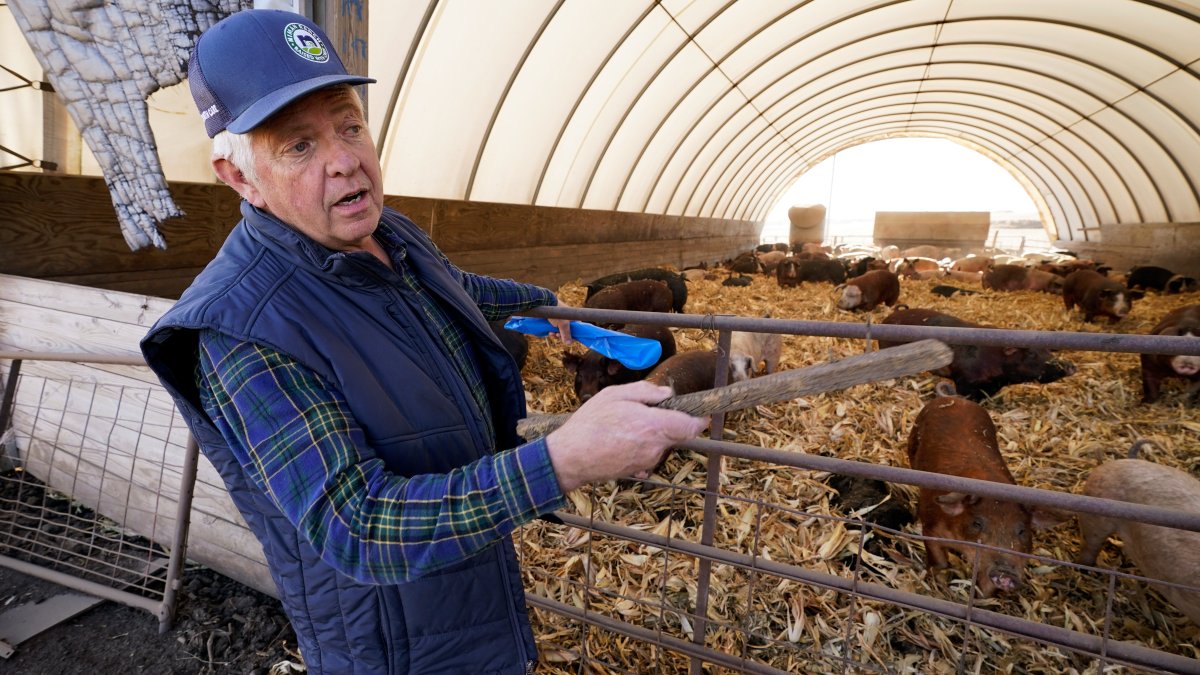From family home equipment within the USA to grocery shops in Hungary to petrol stations in Poland – rising client costs resulting from excessive power prices and interruptions within the provide chain are a burden on households and companies world wide.
Rising inflation is driving the value of meals, gasoline and different merchandise up, forcing many individuals to decide on whether or not to dig deeper or tighten their belts. It’s significantly unhealthy in creating nations.
“We seen that we have been consuming much less,” mentioned Gabor Pardi, a purchaser at an open-air meals market in Hungary’s capital Budapest, after just lately shopping for a sack of contemporary greens. “We attempt to purchase the most affordable and most cost-effective issues, even when they do not look that good.”
Virtually two years on from the COVID-19 pandemic, the financial influence of the disaster continues to be being felt, even after nations emerged from debilitating lockdowns and client demand picked up once more. Now, one other surge in infections and a brand new variant of the coronavirus, Omicron, are inflicting nations to tighten their borders and impose different restrictions, threatening international financial restoration.
Omicron has raised new fears that factories, ports and delivery yards could also be briefly closed, including extra strain to international commerce and driving costs up even additional.
“A brand new spherical of infections might additional tighten provide chains and push inflation up even additional,” mentioned Rubeela Farooqi, US chief economist at Excessive Frequency Economics.
The financial repercussions hit Central and Jap Europe significantly onerous, the place nations have a few of the highest inflation charges within the 27-nation EU and persons are struggling to purchase meals or fill their gas tanks.
A butcher within the Budapest grocery market, Ildiko Vardos Serfozo, mentioned she noticed a decline in enterprise as prospects go to multinational grocery chains that may supply reductions by shopping for massive wholesale portions.
“Consumers are price-conscious and due to this fact typically go away us behind, even when our merchandise are of top of the range. Cash talks, ”she mentioned. “We’re realizing that inflation just isn’t good for us. … I am simply glad that my kids do not need to proceed working this household enterprise, I do not see a lot future in it. “
In close by Poland, Barbara Grotowska, a 71-year-old pensioner, advised a reduction retailer within the capital, Warsaw, that she was hit hardest by her rubbish assortment payment, which nearly tripled to 88 zloty ($ 21). She additionally complained that the cooking oil she used rose by one-third the value to 10 zlotys ($ 2.40).
“That is an actual distinction,” she mentioned.
The latest surge in inflation has taken enterprise leaders and economists world wide unexpectedly.
Within the spring of 2020, the coronavirus shook the worldwide economic system: Governments ordered bans, retailers closed or shortened opening hours and households stayed at house. Firms ready for the worst, canceling orders and pushing aside investments.
To avert financial catastrophe, rich nations – led by the US – launched trillions of {dollars} in authorities help, an financial mobilization on a scale not seen since World Struggle II. The central banks additionally reduce rates of interest to revive financial exercise.
However these efforts to spice up the economic system had unintended penalties: As customers felt extra inspired to spend the cash they acquired via authorities help or mushy loans, and the introduction of vaccines inspired folks to return to eating places, bars, and retailers That elevated demand as the flexibility of suppliers to maintain tempo elevated.
Ports and freight yards have been all of a sudden clogged with shipments, and costs began to rise as international provide chains collapsed – particularly as new outbreaks of COVID-19 typically shut down factories and ports in Asia.
The worth enhance was dramatic. The Worldwide Financial Fund predicts that international client costs will rise 4.3% this yr, the most important leap since 2011.
It’s most pronounced within the creating nations of Central and Jap Europe, with the best annual charges in Lithuania (8.2%), Estonia (6.8%) and Hungary (6.6%). In Poland, one of many quickest rising economies in Europe, inflation reached 6.4% in October, the best degree in 20 years.
A number of customers at a vegetable stall in Warsaw mentioned they have been involved about rising costs for staple meals like bread and anticipated the scenario to worsen within the New Yr when power costs rise.
Piotr Molak, a 44-year-old vegetable vendor, mentioned he hasn’t needed to elevate costs on the potatoes, apples or carrots he sells, however the cherry tomatoes he imports from Spain and Italy and buys in euros have come a protracted far more costly , as Poland’s forex, the zloty, has weakened.
“We are going to really feel this particularly within the new yr, when the present will increase,” mentioned Molak. “We’ll actually really feel it when we have now to spend extra on our house than on pleasure.”
The weakening of the currencies in Central and Jap Europe towards the US greenback and the euro is driving up the costs of imports and gas and exacerbating the disaster resulting from provide bottlenecks and different components.
Hungary’s forex, the forint, has misplaced round 16% of its worth towards the greenback previously six months and slipped to an all-time low towards the euro final week. That is a part of a technique by the Hungarian central financial institution to maintain the nation aggressive and entice international corporations on the lookout for low cost labor, mentioned Zsolt Balassi, portfolio supervisor at Maintain Asset Administration in Budapest.
However the costs of imported items have skyrocketed, and international oil costs in US {dollars} have propelled gas prices to document ranges.
“For the reason that Hungarian forint and really all regional currencies are roughly continuously weaker, this may continuously enhance the oil worth in our currencies,” mentioned Balassi.
In response to document gas costs that peaked this month at 506 forints ($ 1.59) for gasoline and 512 forints ($ 1.61) for diesel per liter, the Hungarian authorities introduced an higher restrict of 480 forints ($ 1.50) ) at gasoline stations.
The upcoming elections in Hungary, the place the right-wing ruling social gathering faces the most important problem because it was elected in 2010, could also be a little bit simpler, however most likely an element, Balassi mentioned.
“That is in fact a political determination that has huge financial disadvantages, however it’s more likely to make households comfortable,” he mentioned.
The political nature of some financial selections just isn’t restricted to Hungary. Poland’s authorities promised tax cuts on gasoline and electrical energy, in addition to subsidies for the worst hit households.
Poland’s central financial institution, which can be dealing with a weakening forex, has been accused by critics of permitting inflation to rise too excessive for too lengthy in an effort to stimulate financial progress and bolster assist for the ruling social gathering.
The financial institution shocked markets with the timing and scope of two price hikes in October and November to convey costs down, whereas the Hungarian central financial institution raised charges six instances in smaller increments this yr.
Nevertheless, if central banks transfer too aggressively too quickly to regulate inflation, it might shorten financial restoration, mentioned Carmen Reinhart, chief economist on the World Financial institution.
She worries about larger meals costs, which hit the poor most of all in creating nations, the place a disproportionate share of household budgets are used to maintain meals on the desk.
“Meals costs are a barometer of social unrest,” mentioned Reinhart, noting that the Arab Spring riots that started in 2010 have been brought on partly by larger meals costs.
Anna Andrzejczak, 41, was a baby when communism led to Poland in 1989 and solely vaguely remembers the hyperinflation and different financial “turmoil” that accompanied the transition to a market economic system.
However she senses that costs will go up “each time I refill,” with gas prices rising by about 35% over the previous yr.
“We’ve got had a interval of stability over the previous few years, so this inflation is now a giant shock,” mentioned Andrzejczak. “We do not have the value hikes we had again then, however I believe it may be a number of stress.”
___
Wiseman reported from Washington and Gera from Warsaw, Poland.














